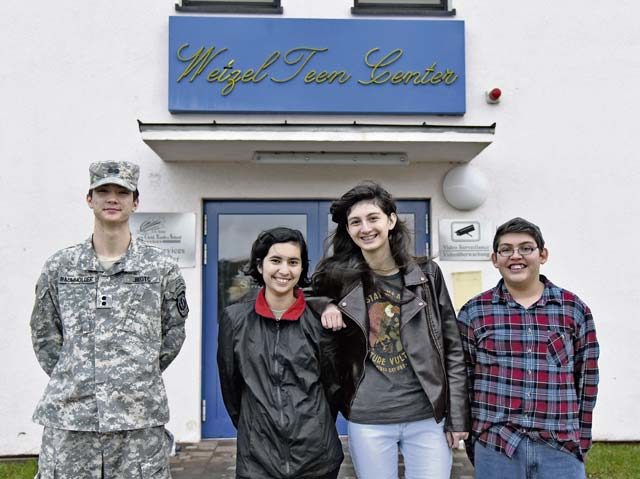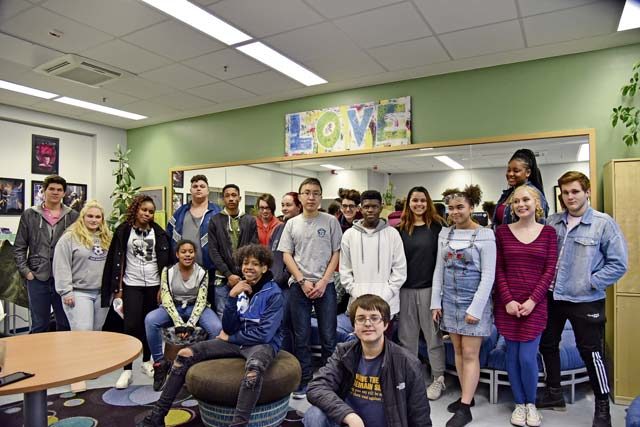
Teens voiced their concerns at an Army Family Action Plan meeting last fall, and now their voices were heard by garrison leadership, Feb. 23.
AFAP provides active-duty and reserve Soldiers, Army civilian employees, spouses, youth, survivors and retirees a role in improving their quality of life by identifying issues for resolution by Army leadership.
“AFAP is important to the community because it allows real change in a grassroots form,” said Heather Miles, Army Volunteer Corps coordinator. “Each member has an opportunity to voice their ideas so leadership can hear what the community needs to thrive.”
Young adults from Baumholder met with participants from the Landstuhl Teen Center to discuss issues and propose solutions during an AFAP Teen session Nov. 3 to improve both communities for garrison youth.
This was the second time 16-year-old Timur K. was involved in an AFAP teen session, and said he enjoyed taking part in the annual event.
“I’m used to participating in these type of meetings not only for AFAP, but in the Keystone Club as well. We don’t just throw issues out there — we address them and have an active role in finding solutions for the changes we would like to see,” said the Wetzel Keystone Club president. “On a small scale, it’s good for teens to discuss our issues, but on a larger scale, it would be great if our meetings actually made things better for everyone in our community.”
Participating in AFAP for the first time, 15-year-old Mia D., said she liked how teen matters are addressed with leadership to affect change.
“I think that it’s amazing that our ideas were heard by someone of importance that could make these things happen,” she said. “I’ve never had the opportunity to help make a difference in our community, so it makes me feel good knowing that we were taken seriously, and I look forward to being involved again.”
Some teen initiatives were already put into place on a trial basis in Baumholder. The lack of weekend activities was an issue impacting teen morale in the area, and the proposed fix was to open the post exchange and eateries on the weekends. Two months later, their suggestions were put into place on a 90-day trial basis, and it was all due to the handful of teens who wanted to see positive changes take place. Additionally, the Wetzel Teen Center was also opened one Saturday per month. This change is contingent upon a 15-person minimum attendance to remain open.
“Youth well-being is important for Soldier and family well-being. They have the great experience of moving to new communities and countries, but those moves can be stressful,” Miles said. “By meeting the needs of teens, we keep the whole family more engaged and with a higher quality of life.”
16-year-old Tyler P. participated in the AFAP meeting with several friends from Landstuhl Teen Center as well.
“This was a good opportunity to be involved in our community,” said the senior from Kaiserslautern High School. “I’m glad we were able to get together as a group, think critically and propose solutions.”
The Landstuhl teens brought up the issue of limited transportation — especially the concern that only one shuttle bus picks up youths from Ramstein and Kaiserslautern high schools. This takes a great deal of time and limits their ability to reach the teen center for homework assistance and social interaction.
“It takes a long time to take the shuttle to the teen center every day,” said Xxayvion T., a 14-year-old KHS freshman, “We also have a lot of teens looking for rides to work too — so having shuttles picking students from each school would be better for us.”
Five issues and proposed resolutions were brought up to the U.S. Army Garrison Rheinland-Pfalz Commander Col. Keith E. Igyarto, Feb. 23. Their concerns were discussed and potential fixes are being worked.
Although the issues came from junior members of the community, the commander was impressed with their collaborative spirit and commitment to help the garrison.
“I’m proud of these young adults for volunteering to be a part of the AFAP process,” the commander said. “I also appreciate the active role they are taking to improve their lives, as well as the teens that move here in the future. Supporting our garrison through continued AFAP involvement makes our community a better place to live and work.”








